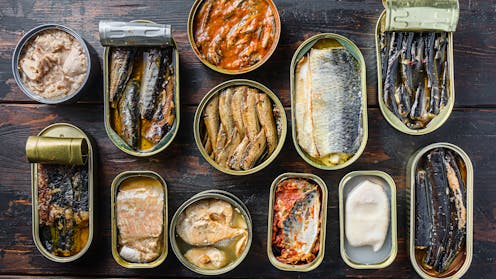
Endocrine disrupting chemicals news, research and analysis - the conversation
- Select a language for the TTS:
- UK English Female
- UK English Male
- US English Female
- US English Male
- Australian Female
- Australian Male
- Language selected: (auto detect) - EN
Play all audios:
May 30, 2025 Antía Lestido Cardama, _Universidade de Santiago de Compostela_ and Lara Pazos Soto, _Universidade de Santiago de Compostela_ Canned food is safe, but cans are often lined with
polymers that can release harmful chemicals, especially into fatty foods. October 12, 2023 Dannielle Piper, _The Conversation_ and Vinita Srivastava, _The Conversation_ In this episode,
Cheryl Thompson, author of ‘Beauty in a Box,’ untangles the roots of hair relaxers for Black women and discusses their potential health dangers and resulting hundreds of lawsuits. June 7,
2023 Leslie Hart, _College of Charleston_ Finding cosmetics that are free of hormone- disrupting chemicals often means paying more. An epidemiologist explains the risk, particularly for
young women. June 23, 2022 Benjamin Elling, _Wesleyan University_ The US Environmental Protection Agency is reexamining the health effects of bisphenol A. A chemist explains why BPA is in
plastics and why it’s hard to find a safe replacement. June 17, 2022 Tracey Woodruff, _University of California, San Francisco_ Due to increasing concerns over the health hazards posed by
BPA, the Food and Drug Administration plans to reevaluate the safety of the controversial chemical for use in everyday products. October 4, 2021 Ann Z. Bauer, _UMass Lowell_ Tylenol has long
been considered a go-to medication for low to moderate pain and for fever reduction, even during pregnancy. But mounting evidence suggests that it is unsafe for fetal development. April 14,
2021 Alex Ford, _University of Portsmouth_ and Gary Hutchison, _Edinburgh Napier University_ Our chemical environment appears responsible for an alarming plummet in sperm counts – in humans
and in animals. February 26, 2021 Stephanie Eick, _University of California, San Francisco_ Scientists issued an urgent call for better federal regulation of these endocrine-disrupting
chemicals. Here’s what you can do to reduce your family’s risk. February 14, 2019 Mark Green, _The University of Melbourne_ and Andrew Pask, _The University of Melbourne_ Disorders affecting
penis development are among the most common birth defects seen in humans, and rates are on the rise. September 13, 2018 Patricia Hunt, _Washington State University_ and Tegan Horan,
_Washington State University_ BPA, used widely in plastics and as a liner in food cans, was replaced by a related chemical called BPS. But it seems that this substitute may also harm eggs
and sperm and disrupt hormones. August 14, 2018 John Meeker, _University of Michigan_ Microplastics are everywhere–our water, soil, and even the air we breathe. The consequences of this
exposure on human health is unknown. But studies in animals give us reason to worry. August 13, 2018 Bruce Blumberg, _University of California, Irvine_ and Raquel Chamorro-Garcia,
_University of California, Irvine_ The most common explanation for obesity is overeating calorie-rich foods and a sedentary lifestyle. But new studies suggest that chemicals in our
environment might be another cause. April 20, 2017 Lee Blaney, _University of Maryland, Baltimore County_ Ingredients from shampoo, sunscreens and other personal care products are turning up
in water supplies. Some are toxic or cause hormonal damage to aquatic life, and could threaten human health. December 27, 2016 Michael P. Holsapple, _Michigan State University_ Many of us
worry about chemicals in our food, but you can relax about one thing.That green bean casserole may have a lot of calories, but not BPA.